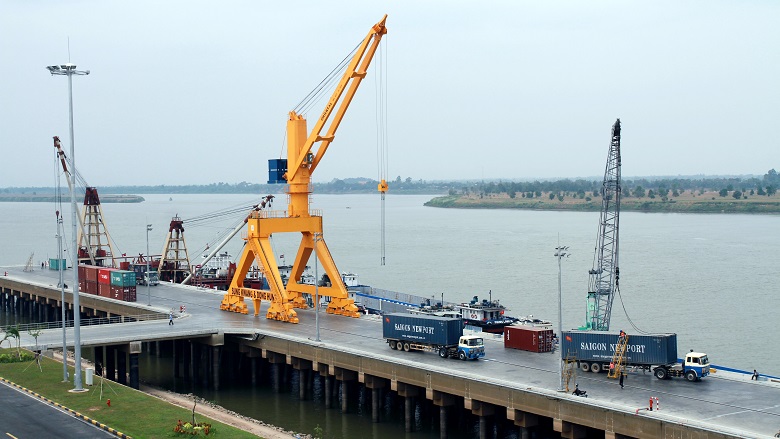Lines of trucks, often hundreds of vehicles long, were a frequent sight at many border crossings at the onset of the COVID-19 pandemic. Quarantining of containers at sea ports and increased delays for restricted goods, including medicine and personal protective equipment, were also common occurrences. Reforms aimed at overcoming these logistical barriers have helped many countries support trade flows. Further trade facilitation measures—the simplification, modernization and harmonization of export and import processes—could play a key role in helping countries to build back better and be more resilient for future emergencies.
Aligning with international standards
When the virus struck, trade agencies rapidly increased requirements and controls to detect goods carrying the virus. Changes often were not harmonized, sometimes even in conflict with each other. In most countries, border procedures became more cumbersome and time-consuming, and many goods were delayed in order to give priority to COVID-related essential goods. In addition, government agencies had to protect the health and safety of employees and those normally involved in face-to-face interactions at the border – and on top of all this – deal with staff shortages due to illness.
The World Trade Organization Trade Facilitation Agreement (TFA) was designed to address these types of challenges. The agreement contains provisions for expediting the movement, release, and clearance of goods, including goods in transit. It also sets out measures for effective cooperation between customs and other border agencies and appropriate authorities on trade facilitation and customs compliance issues. The urgency of the crisis prompted many countries to accelerate implementation of these recommendations and support more efficient cross border trade.
Transparency
During COVID-19, the TFA provided a measure of transparency. Some governments established new websites or enquiry points to provide practical information on import, export and transit procedures and provide forms and documents. Others began conducting regular consultations with stakeholders.
Some governments even went a step further and appointed an Ombudsman to work directly with importers of urgent goods. To accommodate the need for social distancing, some countries set up channels for information exchange between traders and customs officials working from home – through email and virtual meetings.
Border procedures
Many governments quickly introduced innovative and flexible measures to keep trade flowing across borders – in particular to ensure essential goods like vaccines, medical equipment, pharmaceuticals and food products were not delayed. Some of these measures included simplifying forms and procedures, waiving or delaying payment of duties and fees, accepting scanned copies of certificates and other supporting documentation, and accelerating the digitization of border procedures.
Most improvement occurred when innovation was led by the National Trade Facilitation Committee (NTFC)—a required public-private dialogue and leadership mechanism of the TFA to facilitate the domestic coordination and implementation of the TFA’s provisions – and socialized across all border agencies. Furthermore, the pandemic highlighted the necessity of fully involving the Ministry of Health in the design and streamlining of special regimes for vaccines and medical products.
Border agency cooperation
A recent survey conducted by the World Trade Organization on trade facilitation and COVID-19, identified border agency cooperation as one of the most important factors for facilitating trade during COVID. For example, coordination of the relevant border agencies to conduct just one joint inspection saves time and costs.
Coordination between the public and private sectors
In many countries, COVID task forces were set up to manage all pandemic-related tasks. However, in countries where there was not a coordinating mechanism with border agencies to ensure the speedy clearance of goods, the private sector often had to seek multiple approvals and submit duplicate documents. Reducing trade costs at the border requires a partnership approach between the private sector and government to ensure the identification of trade challenges and the validation of trade facilitation reforms.
Digitalization
The WTO survey also highlighted that digital measures, such as ‘single windows’, have helped countries through the crisis and beyond. Single windows are online platforms, which automate trade procedures and replace the need for physical, manual, and duplicative processes. The digital platforms play an important role in speeding up border procedures, allowing seamless processing, and reducing the need for physical contact between border agencies and traders.
Single windows also enhance transparency for trade. Often, the online Single Window platform provides access to trade-related information, ensuring all formalities are accessible to all traders, including micro, small and medium-sized-enterprises (MSMEs) and woman traders, who have been hit hardest by the crisis. Post-pandemic trade facilitation reforms to automate and streamline border procedures, simplify fees, and foster inclusion of MSMEs and women traders will have most effect in spurring recovery.
The World Bank Group, through its Trade Facilitation Support Program, assists countries in achieving successful automation by helping build a roadmap for the national single window (legal, governance, business process reviews, technical architecture, etc.) and to catalyze stakeholder consensus, amongst both the public and private sectors, for the reform.
Improving resilience and ensuring sustainability
As we emerge from the COVID-19 crisis, further trade facilitation measures can help make trade flows more resilient. A ‘whole of government’ approach to trade facilitation and the development of a national trade facilitation strategy would help countries recover more quickly. Sustainable reforms, such as the NTFC, would help countries with future implementation. Furthermore, the digitalization and simplification of trade procedures – saving time and costs for business – will ultimately enhance competitiveness and help countries participate more fully in the global economy.
The World Bank Group is uniquely positioned to support countries through its flagship program: Trade Facilitation Support Program
Reference: https://blogs.worldbank.org/trade/trade-facilitation-critical-covid-19-recovery

